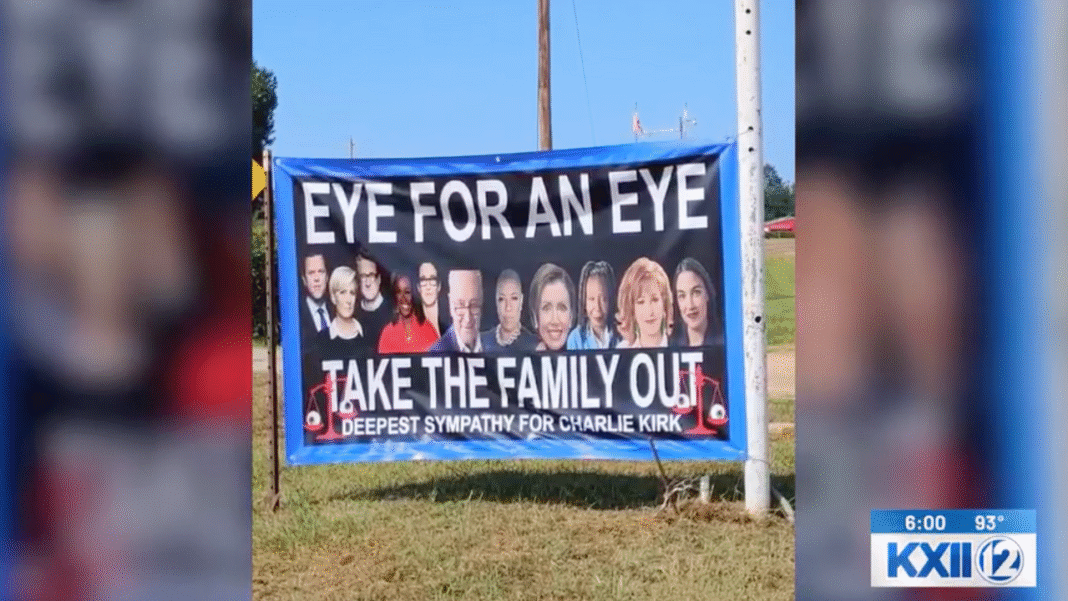A Controversial Sign in Antlers, Oklahoma: Community Reactions and Aftermath
In the quaint town of Antlers, Oklahoma, which boasts a population of around 2,000 residents, a divisive sign recently sparked outrage. The sign called for the “removal” of several Democratic leaders and media personalities, framing the message as a reaction to the death of conservative commentator Charlie Kirk, who was tragically killed on September 10 in Utah. According to KXII 12, a local news outlet, this sign drew immediate attention, both within the small community and beyond, igniting discussions about morality, revenge, and community responsibility.
The Content of the Sign
The controversial sign did not hold back in its messaging. It featured prominent photographs of figures such as Rep. Alexandria Ocasio-Cortez, Whoopi Goldberg, Sen. Chuck Schumer, and Symone Sanders, among others. The declaration “Eye for an Eye” accompanied the images, suggesting a cycle of vengeance rather than resolution. At the bottom of the sign, a message of “Deepest Sympathies for Charlie Kirk” attempted to connect the call for retaliation to his death, further escalating the tension surrounding this already contentious issue.
Community Outrage
As news of the sign spread, many residents expressed their horror and disgust. A sense of solidarity emerged among those who felt that the sign was not representative of their values. The local online community buzzed with responses, highlighting feelings of sadness and disbelief that someone from their small town would advocate for violence and vengeance. This collective sentiment set the stage for action, as many sought to distance themselves from the sign’s message.
One Woman Takes a Stand
Kristi Mack, a resident of Antlers, decided she could not stand by and let the sign remain. Upon hearing multiple anguished reactions on social media, she felt compelled to intervene. “I was just horrified and saddened that somebody in our community would want to fight vengeance with vengeance,” she recounted. In an act of defiance against what she saw as toxic rhetoric, Mack took matters into her own hands and physically removed the sign, choosing to set it ablaze as a symbolic gesture.
Confrontation and Community Tensions
Mack’s actions did not go unnoticed, and the sign’s owner was quick to confront her. Feeling threatened, they attempted to intimidate Mack into paying “restitution” for the sign, suggesting potential legal consequences if she did not comply. “About 20 minutes later,” Mack described, “the person came to my house… and told me that if I would pay restitution, he would not have me thrown in jail.”
This confrontation highlighted underlying tensions within the community. Although the owner approached Mack with a mix of anger and respect, it exemplified how deeply the sign’s message had penetrated the fabric of Antlers. Mack ultimately chose to pay the restitution, stating, “It was the best $100 I’ve ever spent,” illustrating her commitment to promoting a more peaceful dialogue in her hometown.
The Ripple Effect
The incident in Antlers has left many residents pondering the implications of such a divisive message within their community. Conversations about free speech, accountability, and the moral responsibilities of citizens to uphold communal values have surfaced in schools, town halls, and online discussions.
As the dust settles, the community faces crucial questions about its identity and values. For many, the quick actions taken by individuals like Kristi Mack resonate deeply, and a renewed sense of unity is emerging in response to divisive rhetoric. The story of the controversial sign may just be a chapter in a larger narrative about how small towns grapple with expressing dissent while maintaining community cohesion.
Through this lens, the sign serves as a reminder of the power of words, the fragility of community, and the potential for individuals to effect change in their surroundings.



